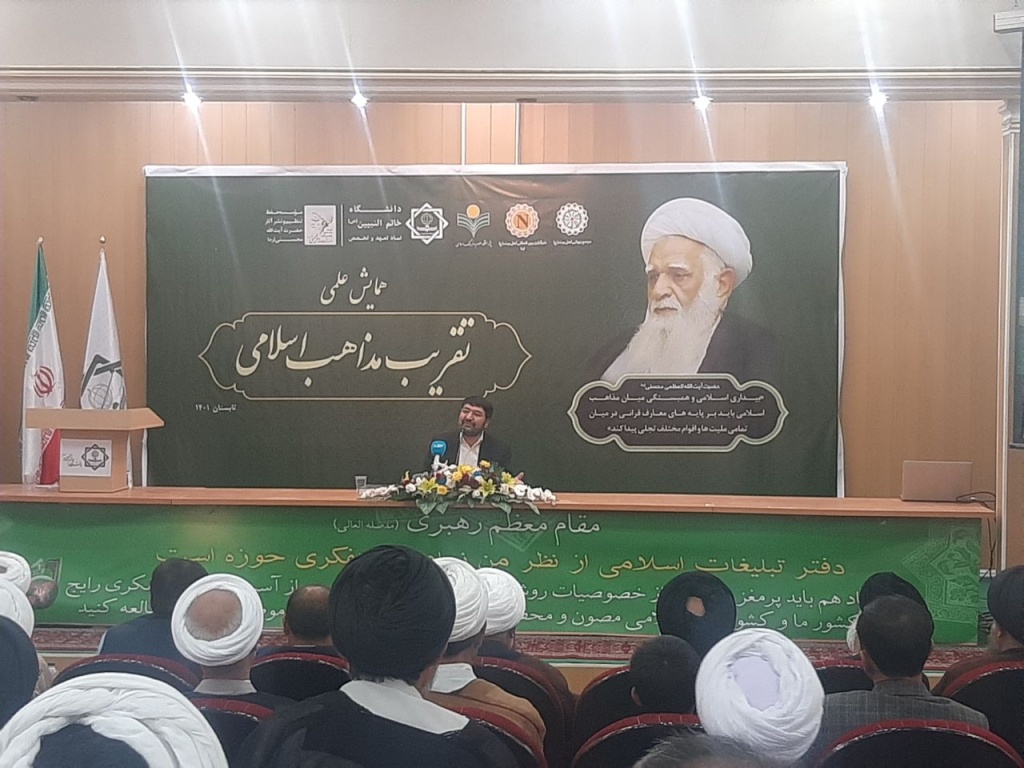Ayatollah Asif Mohseni flag bearer of proximity discourse: Sajjadi
The president of Khatam al-Nabiyin (p.b.u.h) University stated, “Ayatollah Asif Mohseni was the flag bearer of the proximity discourse and had scientific and practical innovation in this regard.”
On the Thursday morning, August 25, 2022, in the commemoration ceremony that was held on the third demise anniversary of Ayatollah Asif Mohseni titled the scientific conference “Approximation of Islamic denominations; theory to practice” in the Conference Hall of the Islamic Sciences and Culture Academy, emphasizing the Islamic unity, Dr. Abdul Qayyum Sajjadi stated, “The approximation of Islamic schools of thought is very important in the contemporary era. The Quran called the Islamic Ummah a unified and moderate Ummah. According to the Quranic verses, one should listen to different points of view and choose the best.”

Dr. Sajjadi continued, “In the sub-principles of jurisprudence, pluralism is expressed. Ijtihad means the effort of jurists to obtain the truth. But error is also an accepted principle in the ijtihad.”
“In the Islamic world, there are two contradictory discourses of moderation and approximation against extremism and takfirism. Without explanation about takfiri discourse, is not possible to have proximity discourse. Ayatollah Asif Mohseni was the flag bearer of the proximity discourse and had scientific and practical innovation in this regard. He took unique steps in both theoretical and practical issues of the mentioned discourse,” added the president of Khatam al-Nabiyin (p.b.u.h) University.
Referring to Ayatollah Asif Mohseni’s efforts to approximate Islamic schools of thought, Sajjadi stated, “He strived to remove the obstacles of approximation and provided solutions in this field. Ayatollah Asif Mohseni believed in the approximation of Islamic denominations, he did not believe that Shiites and Sunnis should give up their beliefs. Rather, he believed that they should refrain from insulting each other.”
“Ayatollah Asif believed that we should not expect Sunni scholars to give up their beliefs and become Shiites or vice versa. Rather, we have commonalities that invite us to empathize. Islam wants us to have brotherhood to unite. Islam obliges us to refrain from discussions that cause the disintegration of the Islamic Ummah. Today, the political necessity of the Islamic Ummah demands that practical steps be taken for brotherhood in order to improve the unpleasant state of the Islamic society. As long as there is hypocrisy and division, the disorder will continue” he continued.
“According to Ayatollah Asif Mohseni, Shiite and Sunni have three principles in common, and whoever adheres to these principles, his life and property are respected by Muslims. Based on authentic Shiite and Sunni traditions, if a person believes in monotheism, prophethood and resurrection, he is considered a believer in Islam. According to Ayatollah Asif Mohseni, Shiite and Sunni have more commonalities than their differences,” added the president of Khatam al-Nabiyin (p.b.u.h) University.
“The scholarly explanation of Islam was emphasized by Ayatollah Asif Mohseni. According to him, the root of religious prejudices is ignorance. He considered the religious war as a war in the darkness, which is the result of unfamiliarity with each other. Ayatollah Asif Mohseni emphasized that the attention of the Islamic Ummah should be drawn to their fate,” Sajjadi said.
“He emphasized on explaining the ideas of Muhammadan Islam and argued that we should believe that the fundamentals of Islam are common between Shiite and Sunni. According to Ayatollah Asif Mohseni’s point of view, Takfiri discourse should be criticized through the Quran and Sunnah in a scholarly manner. He called for compiling a common Tafsir of the Quran by Shiite and Sunni, and also extracting and publishing common hadiths between Shiites and Sunnis. Because all Islamic denominations believe in the love of AhlulBayt (a.s.),” he continued.
“Ayatollah Asif Mohseni emphasized on practical solutions for proximity of Islamic denominations such as establishing schools and scientific centers for Shiite and Sunni clerics and scholars, holding scientific and jurisprudential seminars on various topics, and establishing social and scientific councils such as the Council of Islamic Brotherhood,” noted the president of Khatam al-Nabiyin (p.b.u.h) University.
The organizes of the commemoration ceremony that was held on the third demise anniversary of Ayatollah Asif Mohseni titled the scientific conference “Approximation of Islamic denominations; theory to practice”, are AhlulBayt (a.s.) World Assembly, AhlulBayt (a.s.) News Agency – ABNA, Islamic Sciences and Culture Academy, Khatam Al Nabieen (p.b.u.h) University, and the Institute for Editing and Publishing works of Ayatollah Asif Mohseni.
Ayatollah Mohammad Asif Mohseni Kandahari, one of the great Shia ulama of Afghanistan, a member of the Supreme Council of the AhlulBayt (a.s.) World Assembly, and the head of the Council for Islamic Brotherhood of Afghanistan, passed on August 5, 2019, at the age of 85 in Kabul, Afghanistan.
The president of Khatam al-Nabiyin (p.b.u.h) University stated, “Ayatollah Asif Mohseni was the flag bearer of the proximity discourse and had scientific and practical innovation in this regard.”
On the Thursday morning, August 25, 2022, in the commemoration ceremony that was held on the third demise anniversary of Ayatollah Asif Mohseni titled the scientific conference “Approximation of Islamic denominations; theory to practice” in the Conference Hall of the Islamic Sciences and Culture Academy, emphasizing the Islamic unity, Dr. Abdul Qayyum Sajjadi stated, “The approximation of Islamic schools of thought is very important in the contemporary era. The Quran called the Islamic Ummah a unified and moderate Ummah. According to the Quranic verses, one should listen to different points of view and choose the best.”

Dr. Sajjadi continued, “In the sub-principles of jurisprudence, pluralism is expressed. Ijtihad means the effort of jurists to obtain the truth. But error is also an accepted principle in the ijtihad.”
“In the Islamic world, there are two contradictory discourses of moderation and approximation against extremism and takfirism. Without explanation about takfiri discourse, is not possible to have proximity discourse. Ayatollah Asif Mohseni was the flag bearer of the proximity discourse and had scientific and practical innovation in this regard. He took unique steps in both theoretical and practical issues of the mentioned discourse,” added the president of Khatam al-Nabiyin (p.b.u.h) University.
Referring to Ayatollah Asif Mohseni’s efforts to approximate Islamic schools of thought, Sajjadi stated, “He strived to remove the obstacles of approximation and provided solutions in this field. Ayatollah Asif Mohseni believed in the approximation of Islamic denominations, he did not believe that Shiites and Sunnis should give up their beliefs. Rather, he believed that they should refrain from insulting each other.”
“Ayatollah Asif believed that we should not expect Sunni scholars to give up their beliefs and become Shiites or vice versa. Rather, we have commonalities that invite us to empathize. Islam wants us to have brotherhood to unite. Islam obliges us to refrain from discussions that cause the disintegration of the Islamic Ummah. Today, the political necessity of the Islamic Ummah demands that practical steps be taken for brotherhood in order to improve the unpleasant state of the Islamic society. As long as there is hypocrisy and division, the disorder will continue” he continued.
“According to Ayatollah Asif Mohseni, Shiite and Sunni have three principles in common, and whoever adheres to these principles, his life and property are respected by Muslims. Based on authentic Shiite and Sunni traditions, if a person believes in monotheism, prophethood and resurrection, he is considered a believer in Islam. According to Ayatollah Asif Mohseni, Shiite and Sunni have more commonalities than their differences,” added the president of Khatam al-Nabiyin (p.b.u.h) University.
“The scholarly explanation of Islam was emphasized by Ayatollah Asif Mohseni. According to him, the root of religious prejudices is ignorance. He considered the religious war as a war in the darkness, which is the result of unfamiliarity with each other. Ayatollah Asif Mohseni emphasized that the attention of the Islamic Ummah should be drawn to their fate,” Sajjadi said.
“He emphasized on explaining the ideas of Muhammadan Islam and argued that we should believe that the fundamentals of Islam are common between Shiite and Sunni. According to Ayatollah Asif Mohseni’s point of view, Takfiri discourse should be criticized through the Quran and Sunnah in a scholarly manner. He called for compiling a common Tafsir of the Quran by Shiite and Sunni, and also extracting and publishing common hadiths between Shiites and Sunnis. Because all Islamic denominations believe in the love of AhlulBayt (a.s.),” he continued.
“Ayatollah Asif Mohseni emphasized on practical solutions for proximity of Islamic denominations such as establishing schools and scientific centers for Shiite and Sunni clerics and scholars, holding scientific and jurisprudential seminars on various topics, and establishing social and scientific councils such as the Council of Islamic Brotherhood,” noted the president of Khatam al-Nabiyin (p.b.u.h) University.
The organizes of the commemoration ceremony that was held on the third demise anniversary of Ayatollah Asif Mohseni titled the scientific conference “Approximation of Islamic denominations; theory to practice”, are AhlulBayt (a.s.) World Assembly, AhlulBayt (a.s.) News Agency – ABNA, Islamic Sciences and Culture Academy, Khatam Al Nabieen (p.b.u.h) University, and the Institute for Editing and Publishing works of Ayatollah Asif Mohseni.
Ayatollah Mohammad Asif Mohseni Kandahari, one of the great Shia ulama of Afghanistan, a member of the Supreme Council of the AhlulBayt (a.s.) World Assembly, and the head of the Council for Islamic Brotherhood of Afghanistan, passed on August 5, 2019, at the age of 85 in Kabul, Afghanistan.





